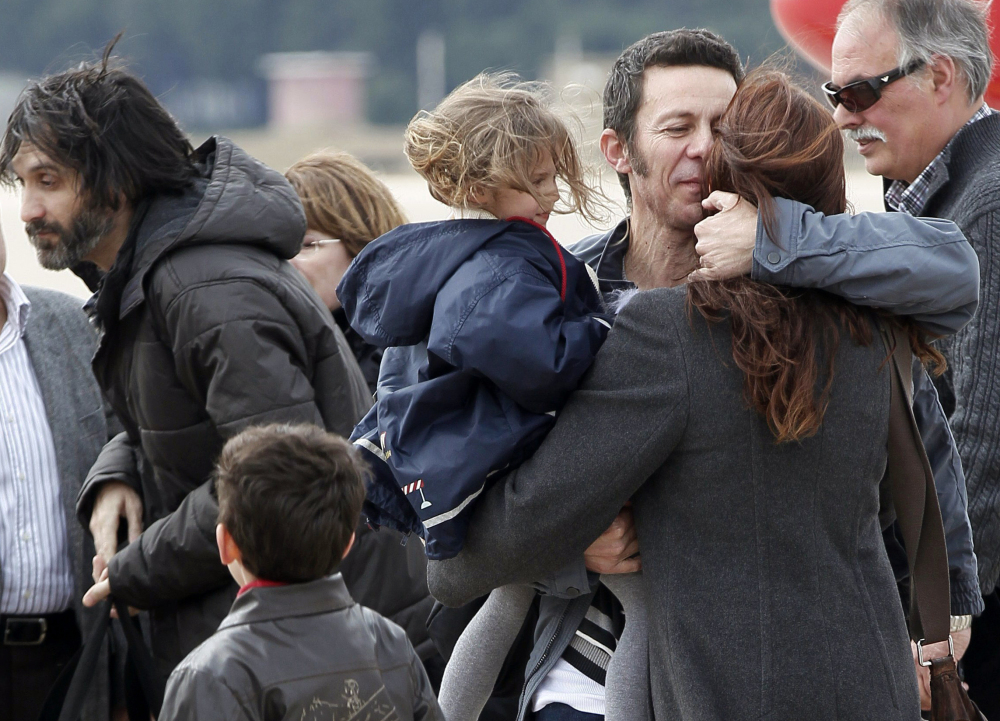MADRID — Two Spanish journalists freed after being held hostage for more than six months in Syria by a rogue al-Qaida group returned home Sunday to an emotional welcome from friends and colleagues.
Veteran reporter Javier Espinosa, Middle East bureau chief of El Mundo newspaper, and Ricardo Garcia Vilanova, a freelance photographer, arrived in Madrid aboard a Spanish government executive jet, less than 24 hours after calling from Turkey to say they were out of captivity and safe.
As Espinosa walked down the steps from the plane, his young son raced across the tarmac and threw his arms around his father in a bear hug. Other family members, newspaper representatives and government officials also were on hand to greet them, according to video of their arrival posted to El Mundo’s website.
Before gaining their freedom, Espinosa and Garcia Vilanova were on a long list of journalists who have been kidnapped while covering the conflict in Syria, which according to press advocacy groups has become the most dangerous country in the world for reporters.
Media rights groups say nearly 30 reporters have been killed there since the conflict began in March 2011. With the two Spanish journalists now free, there are at least nine more foreign correspondents still missing in Syria as well as 10 Syrian reporters.
Jihadi groups, such as the al-Qaida-breakaway Islamic State of Iraq and the Levant, are believed responsible for most kidnappings over the past year, but government-backed militias, criminal gangs and more moderate rebel factions also have been involved with motives ranging from ransom to prisoner exchanges. Most have taken place in rebel-held territories, particularly in chaotic northern and eastern Syria, where extremist groups hold influence.
It was militants from the Islamic State that abducted Espinosa and Garcia Vilanova at a checkpoint in the town of Tal Abyad in the eastern province of Raqqa on Sept. 16. The two men, who have frequently traveled to Syria to cover the fight between President Bashar Assad and the rebels seeking to oust him, were on their way out of the country after a two-week reporting trip when they were seized.
At a hastily-convened news conference Sunday at El Mundo newspaper’s Madrid headquarters, Espinosa and Garcia Vilanova received a standing ovation. They thanked those present for their support, but said they could not provide details of their captivity or how they won their freedom, saying the matter was “out of our hands.”
A spokeswoman for the Foreign Ministry said the government uses “maximum discretion” when dealing with kidnapped journalists, and would not comment on whether a ransom was negotiated. She spoke on condition of anonymity in line with regulations.
For friends and family, word of the journalists’ freedom was reason to rejoice after months of stress. Monica Garcia Prieto, Espinosa’s partner, put it simply in a succinct Tweet: “Pure happiness.”
Journalists are not the only ones who have been targeted for kidnapping. Activists, who do much of the on-the-ground reporting in Syria, are also at risk. Reporters Without Borders says around 20 activists are held by the Islamic State, while an unknown number are held by the government.
The Hanein Network, a militant website that carries al-Qaida statements, issued a plea to the Islamic State in December to release Espinosa and Garcia Vilanova, describing them as “men who risked their lives to report the truth.”
Its home page shows the Spaniards in a soft-focus background. A masked militant of the Islamic State stands in the foreground, holding two cats, in an apparent sentimental appeal for clemency.
Another Spanish reporter who was seized by the Islamic State in September, Marc Marginedas, was released earlier this month.
Send questions/comments to the editors.



Success. Please wait for the page to reload. If the page does not reload within 5 seconds, please refresh the page.
Enter your email and password to access comments.
Hi, to comment on stories you must . This profile is in addition to your subscription and website login.
Already have a commenting profile? .
Invalid username/password.
Please check your email to confirm and complete your registration.
Only subscribers are eligible to post comments. Please subscribe or login first for digital access. Here’s why.
Use the form below to reset your password. When you've submitted your account email, we will send an email with a reset code.